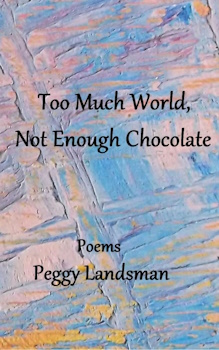
| Too
Much World, Not Enough Chocolate begins (in the
aptly named, Part One) with the poet vividly recalling her
experiences in the second half of the twentieth century,
including growing up with Holocaust survivors, living like
a hermit in the woods, protesting the Vietnam War, living
and working abroad in Israel, Yugoslavia, Japan, and
China; and always responding to sexism, which she
understands to be ubiquitous. The last lines of the
opening poem sum up the complexity of her feelings: “At
the beginning of the twenty-first century/the thing that
still amazes me/is how easily I startle.” In Part Two, the poet explores the joys and sorrows of personal relationships between friends, family members, and lovers, as well as the deep and magical connection she experiences to her own imagination and art. All the poems in Part Two contain images of particular foods, and through the alchemy of poetry, by the time we get to the last lines of the last poem in the collection, we see the everyday event of eating a bagel transformed into an epiphany: “… the hole in the bagel’s enough/love finds its way/through Openness.” |
